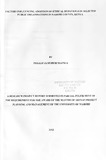| dc.description.abstract | Ethics has long been an outstanding issue in the day to day running of organizations over the past decades. The issue has however become more scrutinized due to the globalization trend which has put more pressure on organizations and governments to be more accountable and responsive to their consumers and citizens. In Africa, the efforts towards recognizing ethical values within governments have been more emphasized due to the high corruption and governance issues and unethical behavior evidenced in their public sectors. The study took a 'prognosis approach towards adoption of ethical behaviour at the organizational level with an endeavor to seek what is being done at the interaction level.
The study sought to investigate the inherent steps taken by the specific government entities within the public service in adoption of ethical behavior in line with this piece of legislation. The study was guided by the following objectives; to identify the influence of institutional framework on adoption of ethical behavior within the public sector in Kenya; to establish the influence of communication on adoption of ethical behavior in sustainable development within the public sector in Kenya; to establish the role of education and training on adoption of ethical behavior within the public sector in Kenya.
The literature review was done in line with the three study objectives of the study under the topic of the independent variables; Institutional framework, leadership and education and training and organizational culture. Chapter three consists of the research methodology that will be used and these include the research design which is of a descriptive survey of the target population which is public organisations (parastatals). The sampling procedure used was the simple random procedure.
Data collection instruments were questionnaire which comprised of both close ended, open ended and Likert-based questionnaire items. The researcher used the Statistical Package for Social Scientists (SPSS) to undertake descriptive statistics presented in tables and further interpretation provided. The study established that there were no policies within the public service organisations to protect employees who reported unethical conduct. Public service organisations were also found to be wanting in undertaking evaluation of ethical programmes. Communication on ethical conduct was done through management meetings at 18.1 %, 11.5% said through email messages, 57.4% said it was through training sessions and 13.0% indicated others, such as through shared folders in the organization and memos.
The study established that 62.8% had received some form of training compared to 37.2% who said they had no form of training. The study gives the following recommendations; organizations should develop their own policies towards ethical management issues, executive or top management should be more engaged in ethical management issues. Education and training should also be tailored - according to organizational staffing, for instance according to departments which may present ethical dilemmas for employees such as procurement and finance departments. Areas of further study are also suggested. | en_US |

